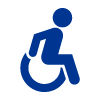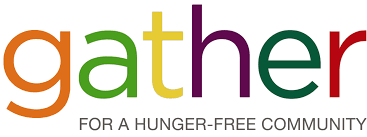Gather Improves Experience for Members with Disabilities
The New Hampshire Disability and Health Program (DHP) collaborated with Gather, a food pantry serving 10,000 people each month in the Seacoast area, to improve the accessibility of their membership registration process. One of the changes Gather made helps them serve people with disabilities better.
Recognizing the Need
People with disabilities are at greater risk of food insecurity—meaning they don’t always have reliable access to enough food. On top of that, food insecurity can worsen existing health conditions and increase the risk of developing new ones, making it even more important to ensure that everyone can access fresh, nutritious food. But many food pantries, like Gather, aren’t always aware of simple changes they can make to meet the needs of people with disabilities.
Taking Action
Gather wanted to change that. With guidance from DHP, they took a few key steps to make their services more inclusive:

Gather contacted DHP to review their registration form for accessibility and provide recommendations.

DHP shared several opportunities for improvement, including plain language recommendations and modifications for individuals with low vision.

DHP also recommended that Gather add an accommodation question to ensure that all individuals have the support needed to access nutritious food.
A Simple Change with a Big Impact
By adding accommodation questions to Gather’s registration process, Gather is making a huge difference. They’re allowing individuals with disabilities to communicate their needs and receive the accommodations they need. Additionally, organizations can better understand the needs of all community members by including a question about accommodation needs on registration forms.
This small but powerful change ensures that all of their members can get the food they need in a way that works for them. It also sets an example for other community organizations to follow.
Anne Hayes, Gather’s Executive Director reflected upon this change, “Gather is particularly concerned about meeting the needs of individuals with disabilities, knowing that the incidence of food insecurity is so much higher among this population. Working with DHP has been very helpful in identifying low-cost ways to up our game. It has also made us more aware of the need and, as we design our new space, we are adding features to make the space more accessible, such as ADA push buttons to open doors and a motorized shopping cart.”
By addressing these needs, Gather helps create a more disability-inclusive environment, allowing all community members to have access to healthier food. Let’s celebrate the steps organizations like Gather are taking—and encourage more community programs to follow their lead in making accessibility a priority!
